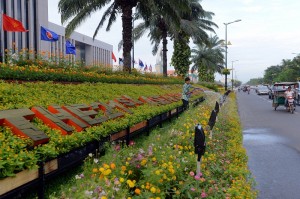PH-Cambodia ties seen improving

A Cambodian worker sprays water on flowers in front of the Peace Palace, the place for the 21st Association of Southeast Asian Nations (ASEAN) summit and Related summits in Phnom Penh on November 15, 2012. AFP PHOTO / TANG CHHIN SOTHY
PHNOM PENH, Cambodia—Ties between the Philippines and Cambodia, soured by differences over how to approach the territorial disputes in the West Philippine Sea (South China Sea), are seen thawing as President Benigno Aquino III makes his second visit here for the biannual summit of Southeast Asian leaders on Saturday.
Manila’s ambassador to Phnom Penh, Noe Wong, said the two neighbors had made progress in deepening relations this year in spite of a diplomatic fracas over how the 10-member Association of Southeast Asian Nations (Asean) should deal with China, Cambodia’s ally and benefactor.
Relations between Cambodia and the Philippines turned frosty after an Asean foreign ministers meeting in July when they tussled over the language of a customary joint communique that was supposed to be issued at the end of the talks.
“I think we have made progress for this 2012 even (if) the July thing that you were asking me a while ago (happened),” Wong said in an interview with Radio-Television Malacañang here.
“There are contentious issues, of course, but overall I could say that positively we are making progress toward that.… The contentious issues are only part of the so many issues that we are going to consider,” he said.
Article continues after this advertisementMr. Aquino will arrive in the Cambodian capital on Saturday for the 21st Asean Summit and related meetings, where he will push for Asean unity in resolving maritime disputes in the West Philippine Sea, or South China Sea.
Article continues after this advertisementPhnom Penh, the host of the 2012 summit, including the foreign ministers meeting in July, came under criticism when it rejected any mention of disputes of individual Asean states with Beijing, particularly the one involving the Scarborough Shoal, which was then at the center of a maritime standoff between Manila and Beijing.
The deadlock stymied the issuance of a joint communique at the close of the meeting, the first time in Asean’s 45-year history, and critics alleged that Cambodia was acting under pressure from China, which did not want any references to the sea disputes in the statement.
The spat came to a head when Cambodia recalled its ambassador to Manila, Hos Sereythonh, after the latter wrote a letter to a national daily accusing the Philippines and Vietnam of “dirty politics” in pushing Asean members to take a common stand on the territorial rows.
According to analysts, the episode showed deep rifts within the Asean bloc, threatening to derail the progress of the drafting of a binding Code of Conduct that would guide negotiations in the West Philippine Sea disputes.
But the Department of Foreign Affairs does not think so.
When asked if the 21st Asean summit provided a chance to mend cracks in the relations of the 10 Asean members, DFA spokesperson Raul Hernandez said he thought there was nothing to fix.
“I think that issue has already been addressed with the submission and also with the approval of the six-point principles that was initiated by Indonesia and which was approved by Asean,” he said at a recent news briefing.
After the Asean foreign ministers meeting failed to release a joint statement, Indonesia scrambled to draft the “six points of consensus,” which, among other things, reaffirmed the Asean’s commitment to honor the 2002 Declaration on the Conduct of Parties in the South China Sea and to work toward the early adoption of a legally binding code of conduct.
“We think that with these six principles on the South China Sea issue, we can move forward,” Hernandez said.
He said the 21st Asean meeting, and its related summits, would have “totally different dynamics.”
“We are hoping and expecting that there will be smooth and very productive results of these meetings as far as our advocacies are concerned,” Hernandez said.
He noted that the Asean had already taken the “first crack” at the drafting of the code of conduct. “In fact, we have already the elements that the Asean members have approved and are ready to present to China,” Hernandez said.
“What is important here is to underscore the Asean centrality and, for Asean, it has always been our position that any initiatives should first be accepted and approved by the Asean and only then would it be presented to other dialogue partners,” he said.
Wong said Cambodia’s chairmanship of the 2012 meetings helped the Asean build the political security, economic and sociocultural pillars of the community, and that its relations with the Philippines were better than ever.
“Now, Cambodia and the Philippines have very excellent bilateral relations. Both countries until now are continuing their efforts to strengthen cooperation in areas which are of mutual interest and benefit,” he said.
He noted that contacts between the two countries date back to the 6th century through the vast trade routes established by Malays in Southeast Asia. But formal diplomatic relations between Manila and Phnom Penh began only in 1957.
Officially, there are 3,497 Filipinos in Cambodia, most of them gainfully employed in a wide range of sectors, from the garments and textile industry, hotels and restaurants to academic institutions and civil society organizations, Wong said.
“I said officially because this is the number of Filipinos who registered in the consular office or in the embassy. But, in my estimate, I could safely say that maybe between 5,000 to 6,000 Filipinos are here,” he added.
Dialogues and consultations between Manila and Phnom Penh will continue through the Joint Conference on Bilateral Cooperation, or the JCBC, Wong said.